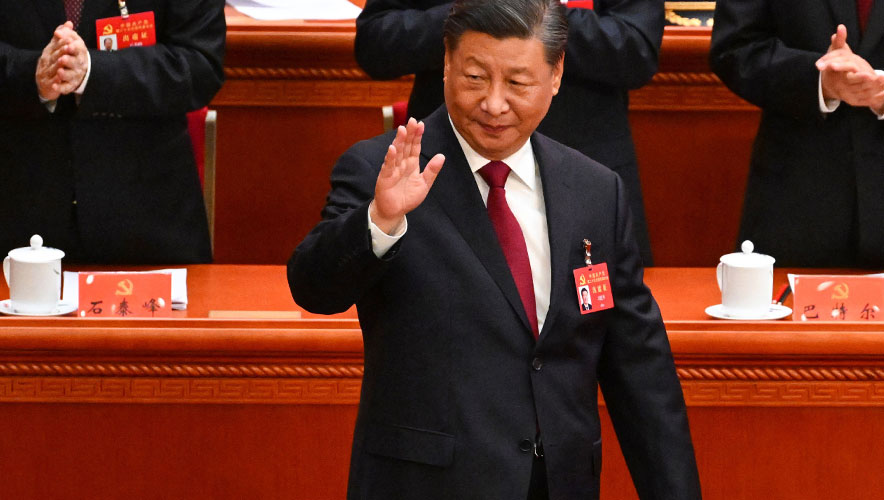Chinese President Xi Hails the Progress He Has Made; Western Nations Respond with Warnings
When Chinese President Xi Jinping speaks, the world takes notice.
On 16 October, Xi kicked off the week-long congress of the Chinese Communist Party with a wide-ranging speech that celebrated the country’s recent advancements and warned of the influences that threaten the country. At the conclusion of the congress, Xi is widely expected to secure a rare, third 5-year term as president.
Xi Jinping defended his hard-line reign on Sunday during a pivotal meeting of China's Communist Party, where he is expected to secure a third term as the party's leader, extending his authoritarian rule. https://t.co/nKJiddmw36
— The New York Times (@nytimes) October 16, 2022
In the speech, Xi said, “Be mindful of dangers in the midst of peace. Get the house in good repair before rain comes, and prepare to undergo the major tests of high winds and waves, and even perilous, stormy seas.”
He praised the country’s COVID pandemic response, which has been widely criticized by those outside the country as brutal and ineffective, renewed dedication to reunifying Taiwan, expressed the need for China to continue its modernization and growth as a world superpower, and said China needed to be self-reliant in serving its domestic market while continuing to be an economic driver around the world.
The world’s leaders took notice of the goals Xi listed, sparking various responses.
As a group of foreign ministers prepare to meet in Luxembourg, European Union Foreign Minister Josep Borrell. According to Reuters, “The bloc has regarded China since 2019 as a partner, tough economic competitor, and systemic rival. Borrell told reporters after Monday's ministerial meeting that the role of competitor had become more central.” Borrell alluded to the current energy situation in Europe, which is struggling to cope with its reliance on Russian oil, as a potential harbinger of future troubles with China if Europe does not diversify its supply chains.
In Germany, officials expressed reservations about a specific project involving a Chinese company’s potential investment in Hamburg port.
“’We are very, very critical of the participation of China in critical infrastructure,’ the head of the foreign intelligence service (BND), Bruno Kahl, told a parliamentary hearing, noting that a port should be considered critical infrastructure, so any possible investment should be very carefully reviewed,” Reuters reported. Germany’s domestic intelligence chief underscored the perceived danger of China, describing Russia as “the storm” and China as “climate change.”
U.S. officials took particular note of the part of Xi’s speech on Taiwan. Xi said China intended to pursue a peaceful reunification but could not rule out use of force if necessary.
“That is what is profoundly disrupting the status quo and creating tremendous tensions,” U.S. Secretary of State Antony Blinken told an audience at Stanford. Tensions between the United States and Taiwan have increased over the past year. Official U.S. policy is vague about military intervention in a conflict involving Taiwan, though U.S. President Joe Biden has recently said the United States would react militarily.
Prior to Xi’s address, a man hung banners that accused Xi of being a dictator across a bridge in Beijing. Chinese authorities detained the man, but his protests have been mimicked and praised at several universities in the United States, the United Kingdom, other cities in Europe, Australia, and Hong Kong. According to the BBC, there have been isolated instances in China of similar protests. The Chinese government has aggressively clamped down on social sharing of the protests in the country.
Protests outside the Chinese consulate in Manchester, England, grew serious when consulate staff reportedly pulled one protestor inside the compound, where the man said he was beaten. A UK police officer entered the grounds and retrieved the protestor.
In other developments not directly related to Xi’s speech or the Chinese Communist Party’s congress, the BBC reported China was able to recruit former British military pilots to train members of the Chinese military. According to the report, “the retired British pilots are being used to help understand the way in which Western planes and pilots operate,” and being paid packages of as much as £237,911 ($270,000). There is no law banning the practice, though UK officials are acting to deter the activity.
And finally, the U.S. Department of Commerce issued an interim final rule that restricts the export of sensitive technology to China. The rule covers many products related to advanced computing, supercomputing, and semiconductors, building on previous restrictions enacted this year.
